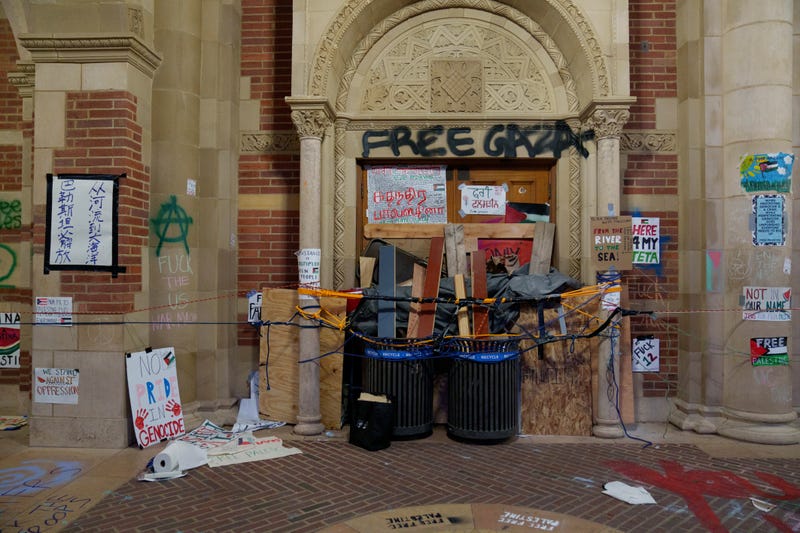
After hundreds were arrested at pro-Palestine demonstrations at USC and UCLA, students from both schools sat down with KNX News Chief Correspondent Charles Feldman to give their perspectives on the events.
Rachel Burnett, a fourth-year undergraduate at UCLA and president of the university’s chapter of J Street U, said that even though she has “fundamental disagreements” with many of the pro-Palestine encampment’s goals, she was “shocked and appalled” at the violence demonstrators faced on Tuesday night.
“While I might have political disagreements with the movement, you know, I oppose violence against our students,” she said. “The fact that a mob of non-students was able to come in, violently assault people in the encampment, bear mace them, pepper spray them, throw firecrackers into the encampment. Quite frankly, someone could have been killed.”
UCLA has come under fire for its slow response to Tuesday’s violence. Police and security officers stood around for hours without intervening as students were attacked by counter-demonstrators, and none of the perpetrators were arrested – a stark contrast to the use of force and mass arrests when police raided the encampment early Thursday morning.
“[On Tuesday] I saw students getting pulled out of the encampment, beat with metal rods, lots of people getting maced … and obviously the police kind of just stood by and watched it happen,” Edmund Tuck, a political science undergrad at UCLA, said. “And then I was out there yesterday into this morning and watched the same police who watched and stood by on Tuesday night into Wednesday morning move in and arrest students.”
Jonathan Park, a third-year undergrad at USC and managing digital editor of the Daily Trojan, noted that it took less than a day for the university’s encampment to be dismantled by law enforcement.
“I think other encampments have at least had a couple days to kind of establish themselves before the administration either decided it was illegal or they thought it encroached on campus safety or whatever,” he said. “But for us, it was like, the day of.”
Jordan Renville, the Daily Trojan’s photo editor, said that the protests have become about more than just the situation in Gaza – they’re also fueled by universities’ attempts at suppression of their students’ free speech.
“At the end of the day, if it is students and if it is people just trying to peacefully express their beliefs, and the reaction of the administrations of various universities is to just immediately bring in the law enforcement – we saw in USC that the encampment was set up at 4 a.m. and DPS was there by like 10,” he said. “So that's a period of six hours where people were just getting ready to get the encampment started, and they were already just trying to bring it down and not hear what these students were trying to say.”
As for the claims that antisemitism is at the core of the pro-Palestine protests, Tuck disagreed, noting that many Jewish students are involved in the protests at UCLA.
“Do I believe that anybody in the encampment set out and their main goal was to hate Jewish people? No,” Renville added. “I think that the main goal was to stop the violence that's happening in Gaza. And I think that a lot of this, honestly, the attention that we're even giving to it kind of distracts from that aspect of the encampment itself.”
Burnett noted that she had seen some antisemitism and dehumanization of Israelis within the pro-Palestine movement, but emphasized that “anti-Zionism and antisemitism are separate.”
“I have seen profound anguish and anxiety from the Jewish community because of these protests. I do think that for many Jewish students who identify as Zionist, it's not seen as an attack on their politics, but an attack on their identity,” she said. “That said, I think we have to distinguish between being uncomfortable, being emotionally unsafe, and being physically unsafe.”
The pro-Palestine protests have been compared to historical campus protests against the Vietnam War and apartheid in South Africa. But those movements took a long time to develop – meanwhile, these protests have spread across the nation in a matter of weeks.
Tuck said social media has played a huge role in allowing people to organize more quickly, adding that young people’s strong opinions about what’s happening in Gaza were also a galvanizing factor.
All four students agreed that young people’s outrage about the situation in Gaza could pose a problem for Biden in the November election.
“I think that any person who's not honestly opposed to what's happening in Gaza and in Israel is subject to losing the youth vote, because as we've talked about before, much of the youth population is opposed to it,” Renville said.
“There's an ongoing war in Gaza that people are protesting against, that the youth are pretty overwhelmingly opposing, and what the Biden administration is putting out is declassifying marijuana and like forgiving student loans every once in a while, while they allow this to continue with their utmost support,” Park said.
Listen to the full special above.
Follow KNX News 97.1 FM
Twitter | Facebook | Instagram | TikTok
